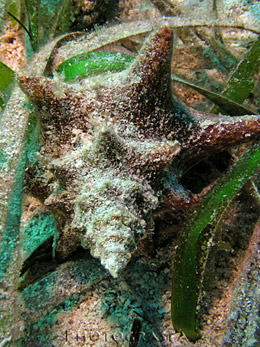
|  |  |  Editorials | Environmental | December 2009 Editorials | Environmental | December 2009  
Mexico's Conch Shells Yield Clues into Effects of Warming
 Agence France-Presse Agence France-Presse
go to original
December 21, 2009


| | The research is seen as vital for mapping the future of the region's marine life. (Christa Loustalot) |  |
Cancun, Mexico - Divers plumb the turquoise depths of ocean waters some 100 kilometers south of this vacation paradise, in search of the distinctive queen conch shell prized by vacationers and souvenir-seekers.

These divers were not searching for a Mexican holiday keepsake however.

They were scientists conducting vital research into the reach of global warming over the centuries in this fragile aquatic ecosystem.

The researchers were attaching electronic probes to about 60 specimen of the queen conch, also known by its marine name Eustrombus gigas, a species of large, edible sea snail native to these waters.

The scientists, who were seeking more information about the impact of climate change off of the Yucatan Peninsula, said the data they are collecting, they said, can provide information yielding information dating back to pre-Columbian times.

"Our findings will not only be relevant for the future of this species, but for mapping the future of global warming" said Dalila Aldana, lead investigator on the project.

The oversized pink conch, which have seen their habitat seriously degraded in the past decade and a half by global warming, are being tagged with computer sensors to monitor their eating and reproductive patterns.

A team of eight researchers are taking part in the study, probing a massive area covering some 14 hectares and encompassing both fresh and salt water.

The research aims to identify the temperature variations over time and to determine how these are manifested in the conch shells and how they impact the viability of the mollusks.

The seven-year study of the pink mollusk is being conducted by researchers from France, Mexico and Australia and is being financed by Mexico's Cinvestav scientific institute and France's National Center for Scientific Research, which goes by the acronym CNSR.

The research in this protected nature preserve - the largest aquatic refuge on the planet - is seen as vital for mapping the future of the region's marine life.

The study is all the more pressing, researcher said, because the ecological water system is at risk from environmental insults introduced by man -- especially climate change.

The queen conch, while not yet endangered, is seen as a species of aquatic life under extreme duress from overfishing. Its the meat is an important food source for humans and is exported around the world while its eye-catching pink shell is exported as a decorative object.

The study will probe not only living ocean mollusks, but also the remains of some some specimens from from pre-Hispanic times, giving researcher a window into fluctuations in water temperatures that occurred as long along as 1500 years ago.

"It will allow us to make projections to determine the magnitude to the global warming process," Aldana said. |

 |
|  |



